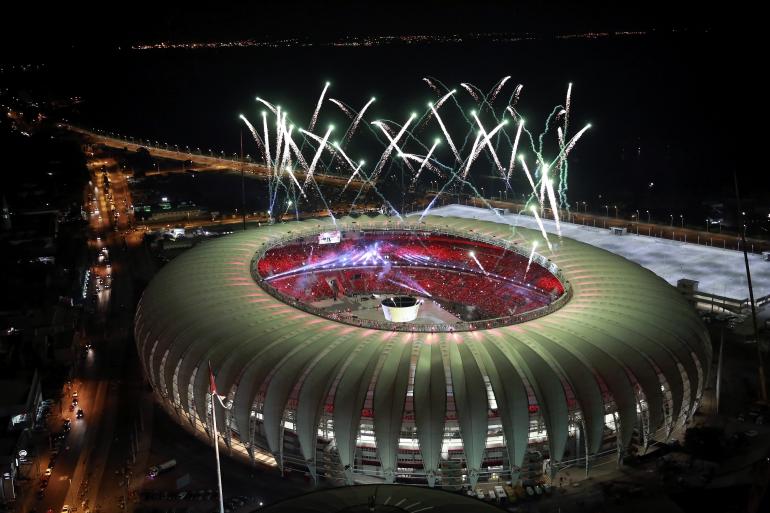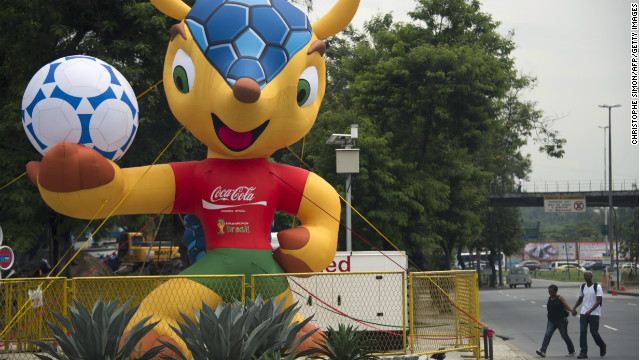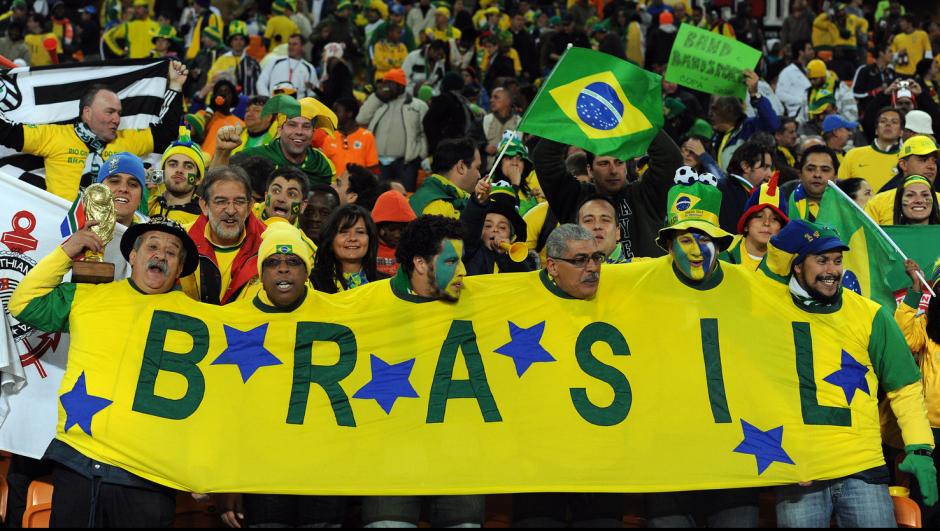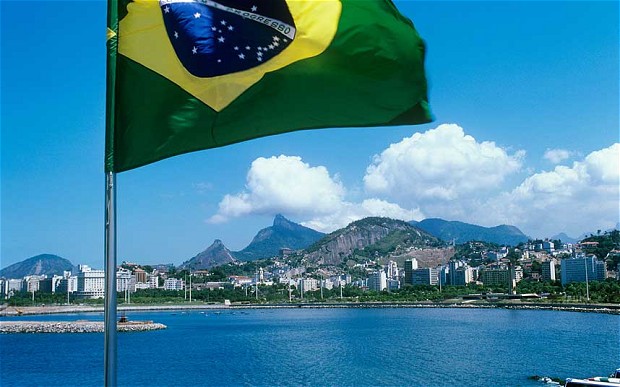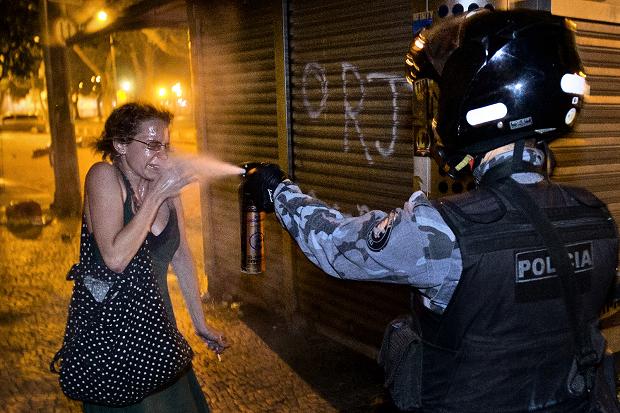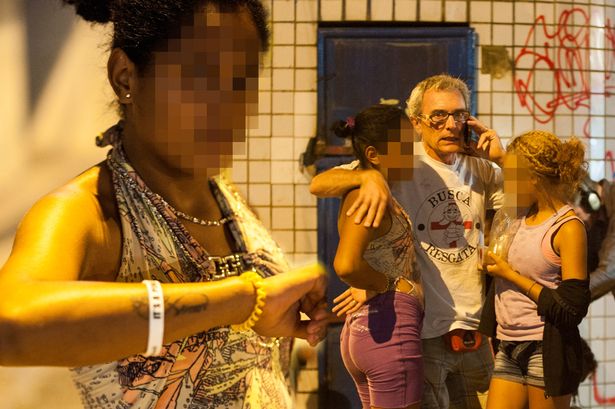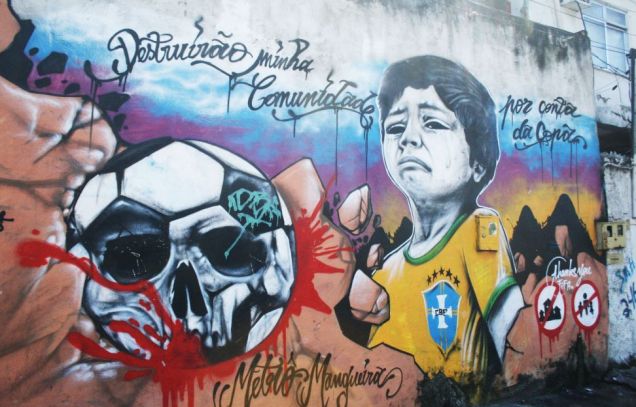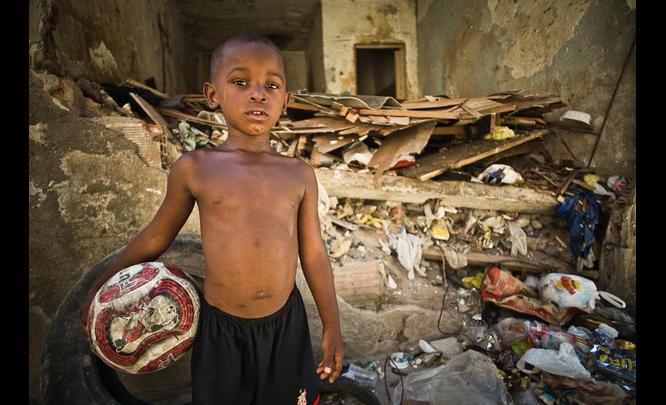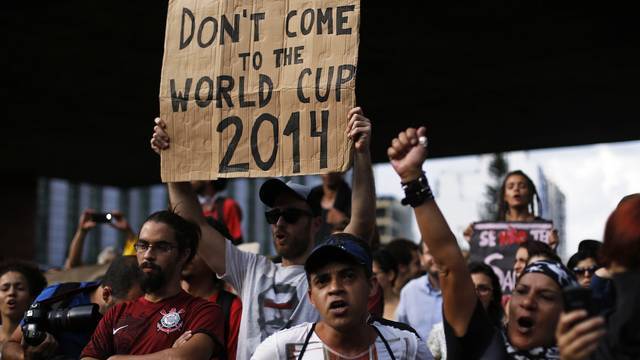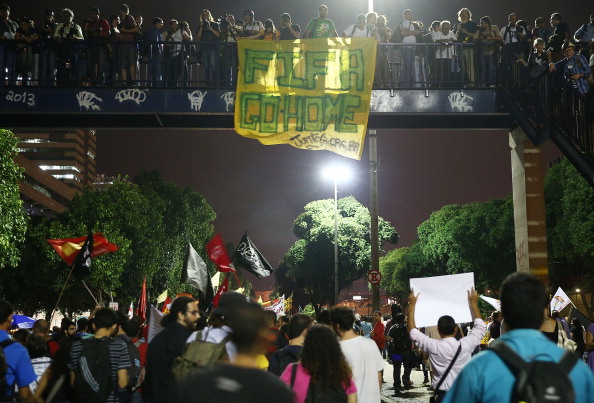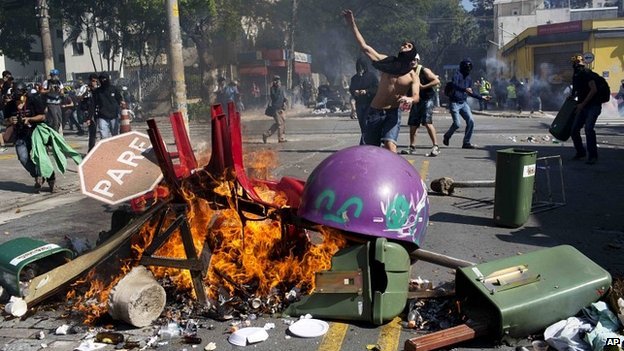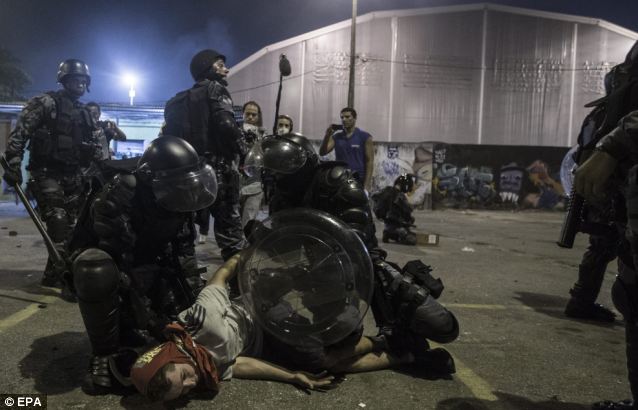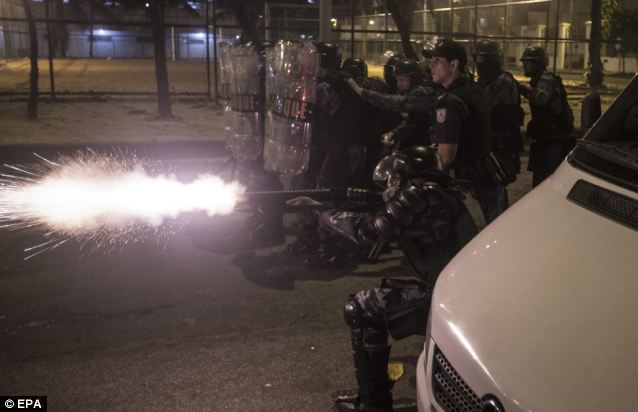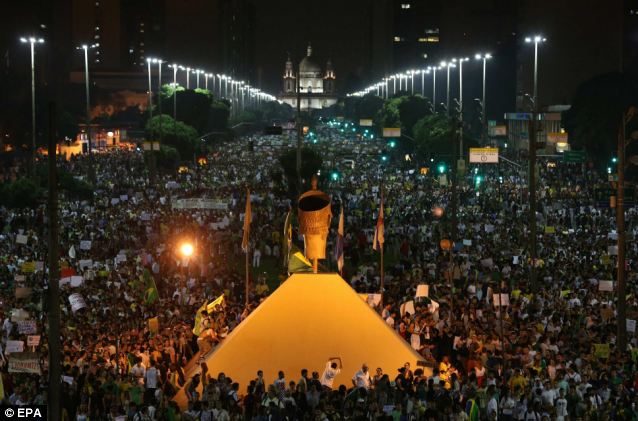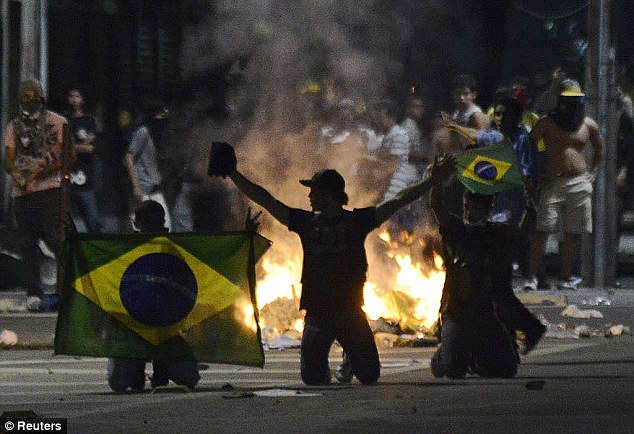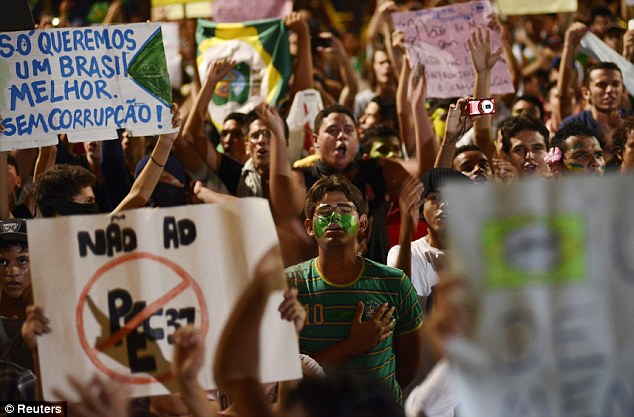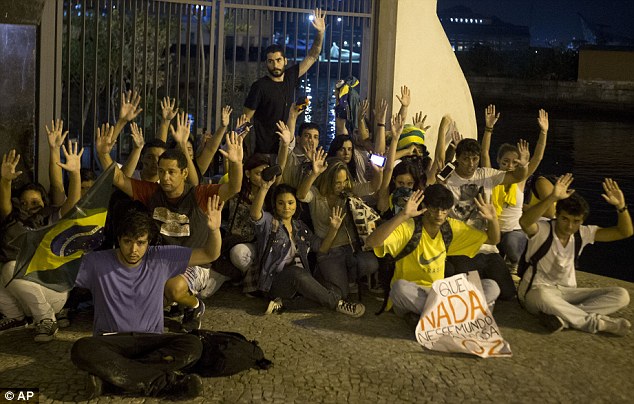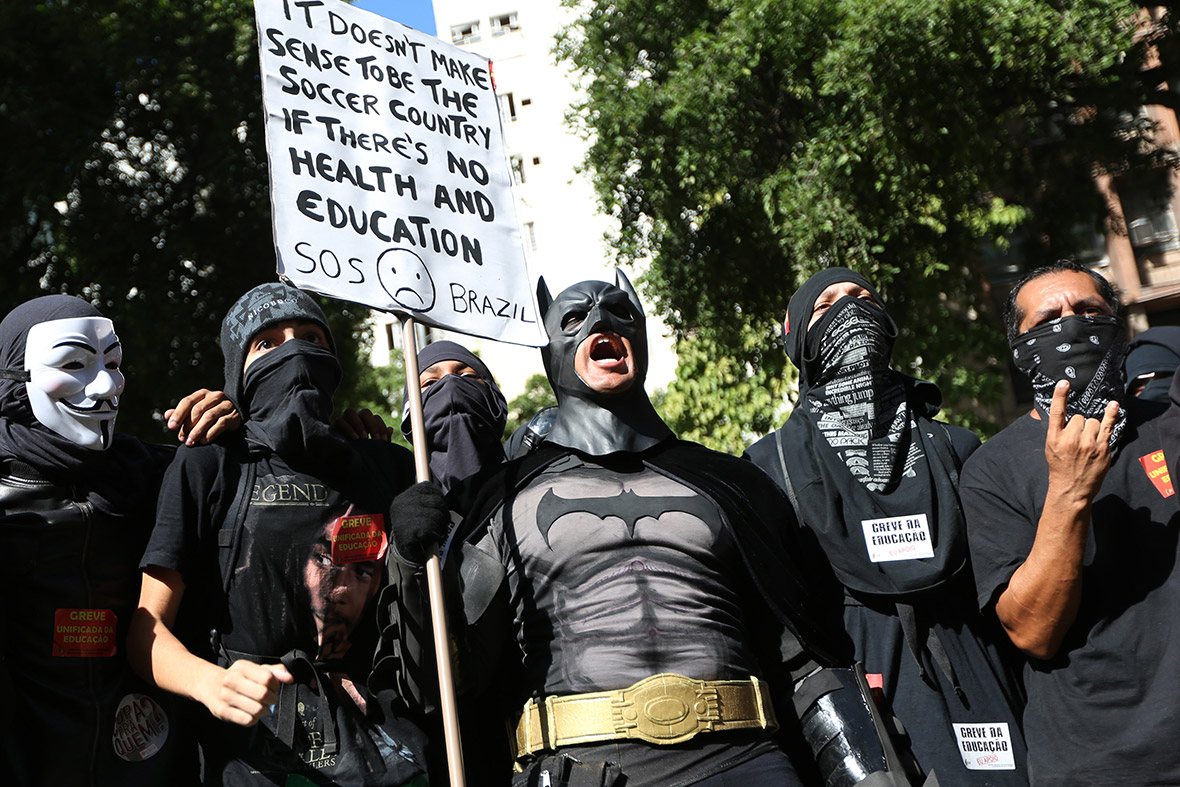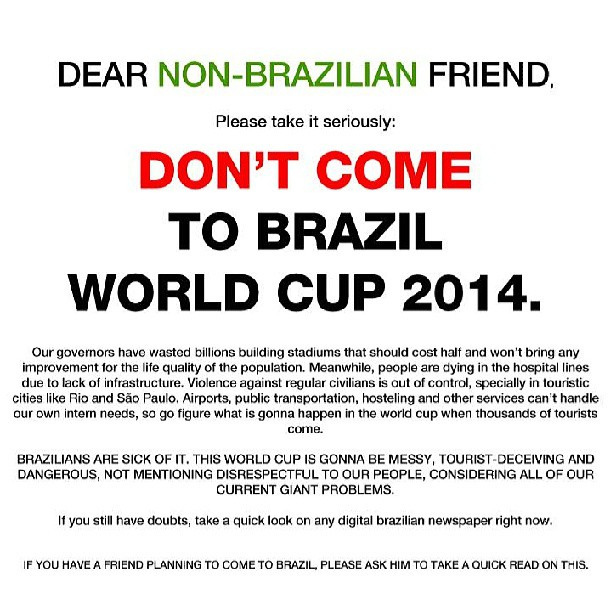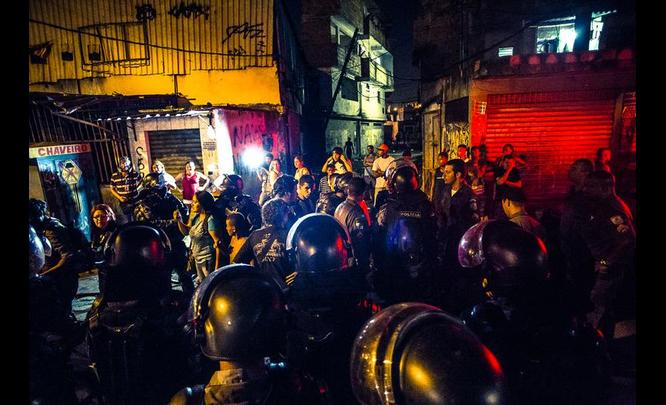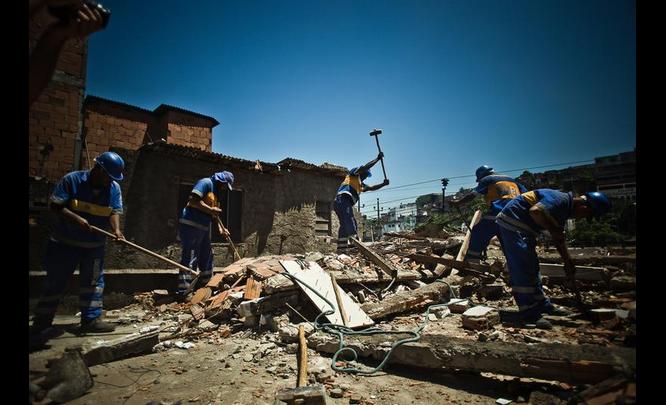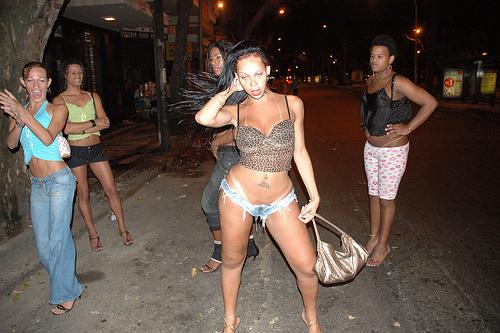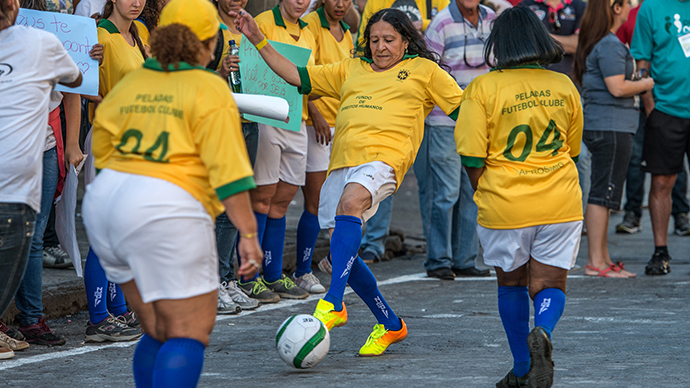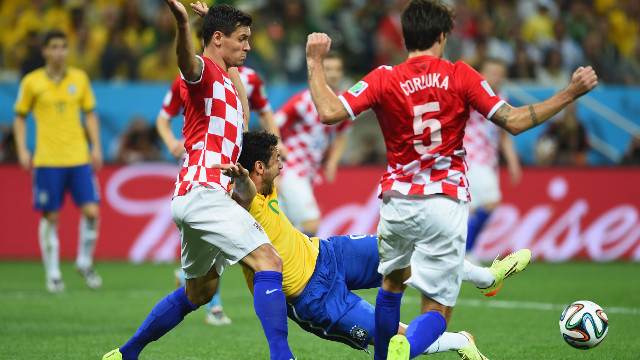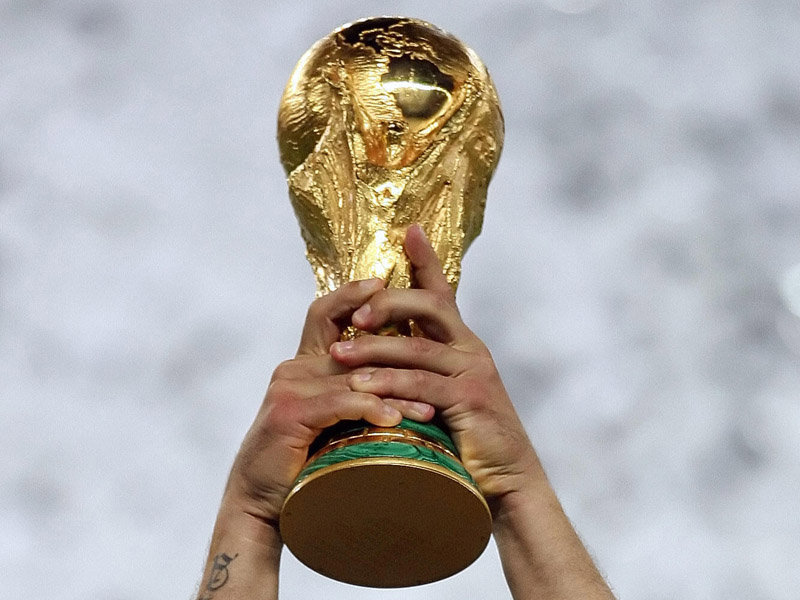[MUST-READ] What Brazil Does Not Want You To Know About The World Cup
Football is back in Brazil, but at whose cost?
These are images we see of the World Cup in Rio de Janeiro, Brazil:
These images, however, are what they don't want us to see:
Violent protests are spreading across Brazil in anger at rising prices and the cost of hosting the World Cup
Image via thetimes.co.ukThe poor communities are being blackmailed and evicted out from their homes with little to no compensation.
Image via newscred.comBehind the happy shadows of Brazilians celebrating the return of football, a million others are shouting for FIFA to go home.
Behind the happy shadows of Brazilians celebrating the return of football, a million others are demanding for FIFA to go home
Image via sportskeeda.comMany in Brazil's middle class are unhappy with the effects the World Cup has already had on their lives. The cost of living has risen in the cities hosting the games, traffic jams have worsened, and a construction boom aimed at improving urban mobility has only compounded problems, they say.
aljazeera.comSince the start of the World Cup, hundreds of anti-World Cup protestors have violently showed their dissatisfaction at different stadiums across Brazil. Police responded with gas canisters, pepper sprays and gun shots.
Protest groups are planning to hold further demonstrations throughout the course of the tournament
Image via bbcimg.co.ukRIO DE JANEIRO, June 15: Police blocked a small group of anti-World Cup protesters who were trying to reach the Maracana stadium in Rio de Janeiro on Sunday, before Argentina played Bosnia in the city's first game of the tournament.
About 150 bandanna-clad protesters carrying banners that said "Fifa go home" marched towards the stadium, causing some stores to shut their doors temporarily and one metro station to close briefly. Police mounted on horseback formed lines to block the group's path to the stadium. Some deployed gas canisters and one protester was doused with pepper spray, local television station Globo News showed.
During the small but violent protest, another man in plainclothes who identifies himself as a police officer also pulls a pistol and fires two shots into the air near the stadium.
Protests against the World Cup have tapered off since Thursday, when police used stun grenades and tear gas against up to 600 masked protesters who were ripping up street signs and otherwise committing vandalism as they tried to reach Sao Paulo's Corinthians stadium on the tournament's opening day. At least six injuries were confirmed, including several foreign journalists.
But recent protests are minuscule compared to the violence and brutality two million Brazilians faced during deadly riots on 13 June 2013 that is now known as quinta sangrenta, or “bloody Thursday”
But anti-World Cup protests have never reached the size of the widespread demonstrations that rattled Brazil a year ago, when up to a million Brazilians at a time took to the streets to protest issues ranging from corruption to police violence.
Nearly 700 protests took place in Brazil in 2013. A new generation of protesters was coming of age and taking its politics to the street. What began as a demonstration against São Paulo’s bus fare increase rapidly evolved into an expression of grievances against social inequity, poor public services, political corruption, and excessive spending on construction for the World Cup and the 2016 Summer Olympics.
Simultaneous demonstrations were reported in at least 80 cities, with a total turnout that may have been close to 2 million. An estimated 110,000 marched in São Paulo, 80,000 in Manaus, 50,000 in Recife, and 20,000 in Belo Horizonte and Salvador. Thirty-five people were injured in the capital Brasilia, where 30,000 people took to the streets. In São Paulo, one man died when a frustrated car driver rammed into the crowd. Elsewhere countless people, including many journalists, were hit by rubber bullets.
Brazilian taxpayers are outraged that the World Cup costs €11.3 billion, making it the most expensive World Cup ever. Yet, education, healthcare and public transportation are severely underfunded.
The estimated cost for hosting the games is said to be more than $11 billion (RM49.32 billion)—making it the most expensive World Cup since the competition began 84 years ago.
cnbc.comMany Brazilians are outraged that services like transportation, education and healthcare are ineffective and underfunded, yet spending for the World Cup could reach the $40 billion mark, which would make it more expensive than the previous 3 world cups combined, according to a Senate study.
"I'm totally against the Cup," one protester in Sao Paulo told AP. "We're in a country where the money doesn't go to the community, and meanwhile we see all these millions spent on stadiums."
“The World Cup in a country of misery, financed by public money, is a moral problem” reads the banner in front of a large scale art-installation-style protest at the centre of Copacabana.
The poor have been the hardest hit as the government forcefully evicted some 250,000 residents from their homes in the favelas. Their homes were demolished without warning to build new infrastructure.
Riot police watch over a protest at Metro-Mangueira against forced evictions. Fifteen houses were demolished before an agreement was reached with residents.
Image via newscred.comCity workers finish demolishing a house in Metro-Mangueira. Families evicted in 2010 were resettled far away.
Image via newscred.comBut it is the poorest Brazilians who have borne the brunt of the World Cup preparations. According to the Popular Committee for the World Cup and Olympics, a group opposed to how the games' preparations have been handled, 250,000 people across Brazil have been forcefully removed from their houses or are being threatened with eviction. Sao Paulo, Rio de Janeiro and Porto Alegre are the most affected cities, it says.
aljazeera.comOn January 7, police forces came by surprise and immediately demolished 12 houses, with all occupants’ belongings inside. The atmosphere was already very tense.
The police resorted to tear gas, pepper spray and sound bombs to clear the way for demolitions, but the community resisted. Protesters from the favela set up a barricade, burned some of the omnipresent debris and faced the police advance.
According to a report published by the People’s Committee for the Cup and Olympic Games in Rio, a comprehensive social movements’ forum, around 3,000 families were already evicted by May 2013, many of them in violent operations backed by the police. More than 8,000 families currently live in areas marked to be removed. Almost all of them are poor people and every marked community is a favela.
Children working the streets to provide for themselves are seeing the spotlight as the influx of tourists is expected to bring a 30% increase in child prostitution. An attempt to crack down on prostitution led to more controversies about police brutality.
Brazil's prostitution industry -- especially the exploitation of thousands of children and teens -- represents the dark side of the 2014 World Cup
Image via ibtimes.comIn Brazil, it is estimated that 500,000 children roam the streets as prostitutes, selling their bodies in order to provide for themselves. Long viewed for its sexually liberal reputation, Brazil has been a popular a destination for sexual tourism. With the growing anticipation of the upcoming World Cup and Olympic Games, the issue of child prostitution has been put in the spotlight by both the Brazilian government and civil society groups as a pressing issue that cannot be ignored.
In Brazil, adults over the age of 18 can legally sell their bodies, but prostitution by younger teens and children is illegal. Still, CBS News reports authorities and experts anticipate a 30 to 40 percent increase in child prostitution during the World Cup, which will bring hundreds of thousands of people to Brazil.
A 20-year-old prostitute in Rio de Janeiro told the Mirror she "became a prostitute three weeks ago" to capitalize on the influx of Britons and other foreigners for the tournament. "I know there will be a lot more customers for the World Cup. I use the money to support my family, pay the rent, the bills," she said. "We are waiting for the English, I cannot speak their language, but I will communicate with the way I know best.”
Brazilian authorities attempted to crack down on prostitution in the months leading up to the World Cup kickoff, generating controversy when some prostitutes allege police arrested, robbed and perhaps even raped about 100 prostitutes on the streets of Niterói in May.
On the other hand, legal sex workers are using the media circus of the World Cup to highlight humiliation and violation they have been facing from the authorities
As football stars are scoring news goals in the World Cup, Brazilian prostitutes decided to join the football fever by organizing an impromptu match to draw attention to sex workers’ rights. Brazilian prostitutes have long complained about humiliation and violations of their rights. They also were urging authorities to treat the ‘world's oldest profession’ like any other.
rt.comThe Prostitutes' Association of Minas Gerais also launched a campaign in 2013 by offering free English classes for about 80,000 sex workers so that ‘naked Brazilian forces’ could be better prepared for the World Cup 2014.
It will be important for the girls who will be able to use English to let their clients know what they are charging and learn about what turns them on," said Cida Vieira, president of the Association of Prostitutes. Prostitution is legal in Brazil, however, it’s illegal to operate a brothel or to employ prostitutes in any other way.
The prostitutes called themselves the Naked Football Club and teamed up with a Christian evangelical group from the US against a local university team in a Brazilian city of Belo Horizonte. "Rights must be the same for everyone. We're no different from anyone else just because we're sex workers," player Patricia Bonges told AFP. "We are finally breaking that prejudice and stigma."
Now, the World Cup is marred by suspicion of corruption, especially after the controversial penalty served to Croatia during the opening match against Brazil
The result of the opening match of the 2014 World Cup was not surprising, but the fact that it is shrouded in controversy is unfortunate. Japanese referee Yuichi Nishimura called a penalty for Brazil after Brazilian striker Fred lost his balance and fell to the ground like he was on a sheet of ice. Dejan Lovren barely made contact with Fred and was playing his position well all match. It was as if Nishimura knew he had made a bad call by running to the end line to avoid backlash from the Croatia players. Neymar converted the penalty and Brazil were on the way to a 3-1 victory.
rantsports.comDiving and embellishment is a stereotype of soccer players. It is also a truth about soccer players. Unfortunately, when the opening match of the World Cup is marred by this action there are many questions. The word “cheated” was being thrown all over last night after the match and it was coming from the casual fan.
rantsports.comFor those more aware of the corruption, there is suspicion that the penalty call was a part of something bigger — a bigger scheme to make sure that the host nation won. Leading up to the match there were supposed images of the FIFA website and a European newspaper showing a 2-2 scoreline. After the match, Croatia coach Niko Kovac said the rules were not the same for both teams.
rantsports.comAmongst all the controversies that have riddled the World Cup, is there a bigger scheme to ensure the host nation wins the 'Copa'?
Amongst all the controversies that have riddled the World Cup, is there a bigger scheme to ensure the host nation wins the 'Copa'?
Image via rainforestcruises.com